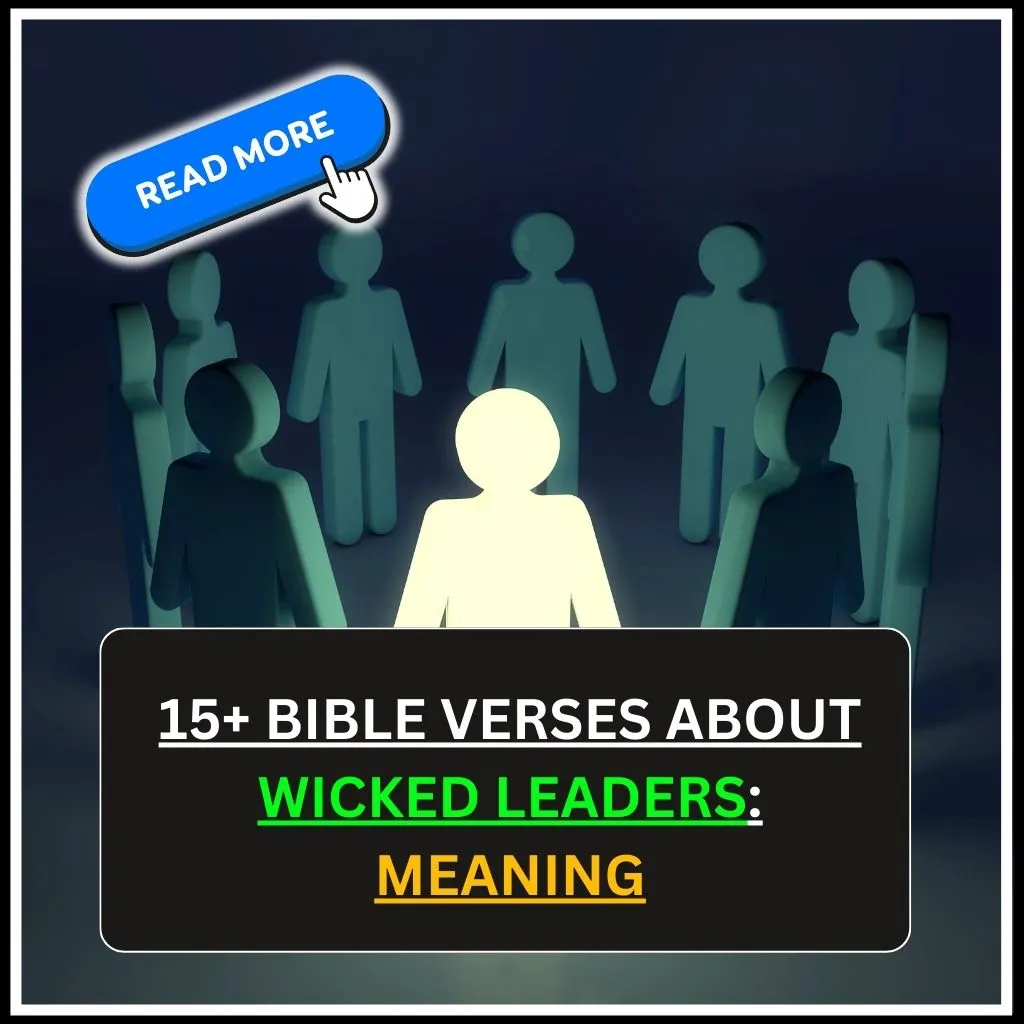In times when leadership seems unjust or oppressive, many of us turn to the Bible for comfort, guidance, and inspiration. Wicked leaders can leave communities feeling hopeless and burdened, yet the Scriptures remind us that righteousness prevails and that God’s wisdom can uplift even the downtrodden.
This article explores 15 Bible Verses About Wicked Leaders, presenting each verse in full, along with its meaning and practical application.
Whether you are seeking spiritual strength or practical advice to navigate challenging times, these verses offer insights that resonate on both an emotional and spiritual level.
1. Proverbs 29:2
“When the righteous thrive, the people rejoice; when the wicked rule, the people groan.”
Meaning: This verse contrasts the outcomes of good versus bad leadership. It suggests that when leaders act with righteousness and integrity, society flourishes. Conversely, under wicked leadership, people experience suffering and despair.
2. Isaiah 10:1
“Woe to those who make unjust laws, to those who issue oppressive decrees.”
Meaning: Isaiah warns against the consequences of leaders who manipulate laws for personal gain or to oppress others. The verse serves as a call to recognize and denounce injustice wherever it appears.
3. Psalm 82:2
“How long will you defend the unjust and show partiality to the wicked?”
Meaning: This verse challenges leaders and institutions that turn a blind eye to injustice. It questions the endurance of systems that favor the wicked over the righteous, urging a return to fairness and accountability.
4. Isaiah 1:23
“Your rulers are rebels, partners with thieves; they all love bribes and chase after gifts. They do not defend the cause of the fatherless; the widow’s case does not come before them.”
Meaning: In this verse, Isaiah condemns leaders who exploit their power for personal gain. It highlights how corruption in leadership leads to the neglect of the vulnerable—those who are orphaned or widowed.
5. Micah 3:11
“Her leaders judge for a bribe, her priests teach for a price, and her prophets tell fortunes for money. Yet they look for the Lord’s support and say, ‘Is not the Lord among us?'”
Meaning: Micah criticizes a society where leaders and religious figures use their positions for personal profit rather than serving with integrity. It contrasts the expectation of divine oversight with the reality of human corruption.
6. Jeremiah 22:13
“Woe to him who builds his palace by unrighteousness, his upper rooms by injustice, making his own people work for nothing, not paying them for their labor.”
Meaning: Jeremiah condemns leaders who enrich themselves through exploitation. The verse exposes the moral decay inherent in leadership built on injustice and the exploitation of labor.
7. 1 Samuel 8:7
“And the Lord told him: ‘Listen to all that the people are saying to you; it is not you they have rejected, but they have rejected me as their king.'”
Meaning: In this passage, God explains that the people’s demand for a human king—potentially a flawed leader—reflects their rejection of divine guidance. It highlights the inherent risks of choosing leaders based solely on human judgment.
8. Proverbs 16:12
“It is an abomination to kings to do wrong, for the throne is established by righteousness.”
Meaning: This verse asserts that leaders who commit injustices tarnish their own legitimacy. Righteousness is presented as the true foundation of lasting and honorable authority.
9. Proverbs 17:15
“Acquitting the guilty and condemning the innocent— the Lord detests them both.”
Meaning: Proverbs 17:15 speaks to the importance of justice. When leaders fail to uphold true justice by protecting the innocent and punishing the guilty, they contribute to systemic corruption and moral decay.
10. Isaiah 32:1
“See, a king will reign in righteousness and rulers will rule with justice.”
Meaning: Isaiah offers a hopeful vision of leadership characterized by righteousness and justice—a stark contrast to the reality of wicked leaders. It serves as a promise that true, just leadership will emerge.
11. Isaiah 33:22
“For the Lord is our judge, the Lord is our lawgiver, the Lord is our king; it is he who will save us.”
Meaning: This verse reassures us that ultimate authority rests with God, who is both just and merciful. When human leadership fails, God’s righteous rule offers hope and salvation.
12. Psalm 72:12
“For he will deliver the needy who cry out, the afflicted who have no one to help.”
Meaning: Although not directly addressing wicked leaders, this verse provides reassurance that God cares for those oppressed by unjust authority. It highlights a promise of rescue and support for the vulnerable.
13. Revelation 13:7
“It was given power to wage war against God’s holy people and to conquer them.”
Meaning: This vivid verse from Revelation depicts a leader endowed with destructive power, set against the faithful. It serves as a stark warning of the dangers inherent in leaders who oppose God’s will and promote evil.
14. 1 Peter 5:3
“Not lording it over those entrusted to you, but being examples to the flock.”
Meaning: This verse encourages leaders to serve as humble examples rather than as tyrants. It contrasts effective, compassionate leadership with the abuse of power seen in wicked rulers.
15. Psalm 146:3
“Do not put your trust in princes, in human beings, who cannot save.”
Meaning: This verse cautions against placing ultimate trust in mortal leaders, who are fallible and often influenced by human weaknesses. It points the believer toward seeking salvation and guidance from God rather than relying solely on human authority.
Conclusion
Reflecting on these Bible verses about wicked leaders offers both comfort and a call to action. While the Scriptures acknowledge the reality of corrupt and oppressive leadership, they also point us toward a higher standard—a vision of leadership grounded in righteousness, justice, and compassion.
As you meditate on these passages, consider how their lessons apply to your life and community. Embrace the hope that, even in challenging times, God’s promise of justice and restoration endures.
